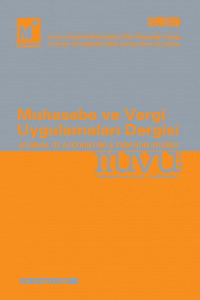TÜRK İŞLETME VE İKTİSAT ÖĞRENCİLERİNİN KURUMSAL SOSYAL SORUMLULUK GÖRÜŞLERİ ÜZERİNE BİR İNCELEME
Kurumsal Sosyal Sorumluluk (KSR), akademik yazında en popular konulardan
biri olarak görülebilir. Bu çalışma, temel olarak Türkiye’nin gelecekteki
muhasebecileri olan Türk işletme ve iktisat öğrencilerinin KSR görüşlerinin
incelenmesini amaçlamaktadır. Bu amacın gerçekleştirilebilmesi için
araştırma aracı olarak Carroll’ın (1979, 1991) modeline dayanan bir anket
geliştirilmiştir. Çalışmanın sonuçları; Türk işletme ve iktisat öğrencilerinin
“yasal sorumlulukları” en önemli KSR unsuru olarak algıladıklarını ve bu unsurun
sırasıyla “ekonomik sorumluluklar”, “etik sorumluluklar” ve “gönüllü
sorumluluklar” tarafından takip edildiğini göstermektedir. Çalışmanın sonuçları
ayrıca cinsiyetleri, meslek tercihleri, bölümleri ve sınıfları açısından
öğrenciler arasında önemli farklılıkların bulunduğunu göstermektedir.
Anahtar Kelimeler:
kurumsal sosyal sorumluluk, işletme ve iktisat öğrencileri, sosyal sorumluluk
AN INVESTIGATION ON TURKISH BUSINESS AND ECONOMICS STUDENTS’ PERCEPTIONS OF CORPORATE SOCIAL RESPONSIBILITY
Corporate Social Responsibility (CSR) can be seen as one of the most popular
themes in academic literature. This study primarily aims to investigate
the CSR perceptions of Turkish business and economics students who
are the future accountants of Turkey. In order to accomplish this purpose,
a questionnaire was developed as a research instrument which was based
on Carroll’s (1979, 1991) framework. Results of the study indicate that Turkish
business and economics students perceived “legal responsibilities”
as the most important CSR component which was followed by “economic
responsibilities”, “ethical responsibilities”, and “philanthropic responsibilities”,
respectively. The results of the study also indicate that there are
significant differences between students in terms of their demographic
characteristics such as gender, career choice, student’s major or academic
classification regarding to the importance of CSR components.
___
- Riliang. Q. 2007. Effects of Government Regulations, Market Orientation and Ownership Structure on Corporate SocialResponsibility in China: An Empirical Study.International Journal of Management, 24, 3, 582-591.
- Snider J., R.P. Hill and D. Martin.2003. Corporate SocialResponsibility in the 21st century: A view from the world’s most successful firms. Journal of Business Ethics, 48, 2, 175-187.
- Spencer, B. A., andJr. J.K.Butler. 1987.Measuring the Relative Importances of SocialResponsibility Components: A Decision Modeling Approach.Journal of Business Ethics, 6, 7, 573-577.
- ISSN: 1308-3740
- Yayın Aralığı: Yılda 2 Sayı
- Başlangıç: 2008
- Yayıncı: Ankara Serbest Muhasebeci Mali Müşavirler Odası
